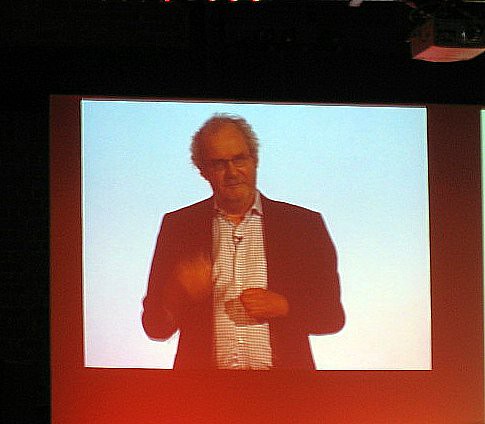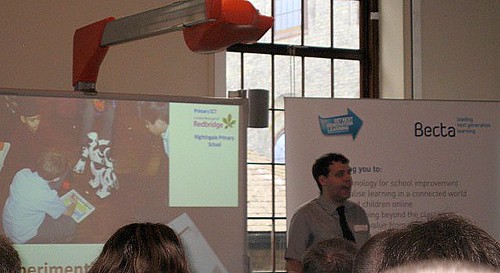Hand Held Learning Conference Day 1
This week I am @ the handheld learning conference in the Barbican, though I hasten to add this is not all week, I am in schools and Subject leaders too!
I am here for two reasons:
1 To find further direction and vision for ICT
2 To Support our Redbridge Delegates : Nicholas Hughes and Dawn Halybone, who are both presenting - I sort of feel like their Dad proudly cheering them on -
I badly typed copious notes throughout the two days and I'll attempt to get posted what I can and what I think is worth sharing and linking to.
This was Andrew Pinder from Becta talking about and staunchly defending the Home Access project earlier today - I loved his passion and determination.
Mondays Blogging Scraps
Today I am here @ the Handeheld learning Confernce in the Barbican. There is a real buzz of excitement in the air and lots to see. The first session of the day takes place upstairs and is a showcase of excellent, outstanding and exciting work in ICT. I have summarised some of my thoughts below:
Session 1 Clunbury school in Shropshire
Clunbury is an isolated school and therefore they do well to be making use of new technologies outside of the metropolitan excitement of somewhere like London or Wolverhampton. I was pleased to see this school present as I had recently watched their programme on Teachers TV.
The head showed us how the school had been using blogging and podcasting and he commented how children with SEN really enjoyed Podcasting. Nice to hear this, but I’d like to know what he means by this umbrellas term of SEN. This phrase of 'the SEN children really got into it', is often bandied around in such innovation reports, but exactly what sen group and how we rarely hear.
We heard a lot about the use of Nintendo DS and it is good to see that this technology is now sneaking into the mainstream. We need to see other schools and authorities experimenting and trying this technology, other than just Dundee and good old Derek.I have to say though the images we saw of young children using the device were inspiring, I was not impressed with the video which showed the device in action.
We saw a group of children being sent a question via Pictochat and then working together to answer the question. Yes it is great that these devices have wireless capability but surely the point of the device in Maths is gaming challenge and this is the principal motivator.
Sitting next to Dawn she has reminded me that the challenge/competitive element is also about being able to improve themselves and reduce or improve their score.
The question I have to ask about any technology is – what does it offer that traditional methods do not and having witnessed Pictochat in action I felt that simply asking the question was faster than sending it via Pictochat and whats more when a question is more detailed as in a problem – Pictochat will not let you dictate such a detailed piece of text.Simply sending a problem by a device doesn't make it any more exciting.
But I have been wrong before
That was yesterday and today I have reflected a little and also witnessed a giant impromtu Pictochat session in the main hall, which wa sone of those moments, where we were both listening and discussing and it was debatable who was actually in control of the room! Today I think there is a place for Pictochat, perhaps as Derek suggested in emergent writing.
Session 2 Nicholas Hughes - Robo- Control
This was Nicholas talking about his Robosapien work. Obviously I did not make notes during this session. There was a lot of interest in the coffee area following his talk as Nicholas and the mini Robot roamed the drinks area. I think the boy did well to convey the childrens' enjoyment factor of ICT Control with a popular robot. Read more on his blog.
Session 3 - Gavin Hawkins Stow Heath Junior School- Wolverhampton
Gavin's school was involved in one of the 2002 Text bed pilots with PDAs. They decided not to give these devices to teachers, but instead gave them to the children. This project grew from 15 devices to over 200. Looking at the video he showed us, these eventually became EDAs, those lovely rubberised PDAs that Steljes used to sell.
They were bale to afford these by making/taking regular contributions form the parents - about £1.50 a week.
We watched a video of this project which showed children using the device at home and school. They started the day by catching up with news from Espresso. Later that day they might use other applications like the Mind Mapping software or animation tools, we saw a child use this animation software to demonstrate the water cycle.- Great!
The EDA Project was part of Learning2Go in Wolverhampton. One student commented, 'they are better than computers because you can just carry them around in a bag'. A teacher said that she thought the children seemed to be learning more and doing more . The use of the EDA allowed the extension of learning to home where children connected the device to their PC and completed their homework and often talked with their parents about what they had been doing.
One problem that the school needed to surmount was that of connecting these devices to the big screen. Teachers were concerned that they couldn't see what the pupils were doing on the device all of the time, they also asked how could they collect the work that children had done on the devices.
Overtime they tried various devices which could display the EDAS- I guess a bit like AB Tutor for EDA/PDAs. These were:
My Mobile which is free - but I can't find it
Dotpocket - http://www.dotpocket.com/
Eventually though the school worked with Steljes to develop the use of synchroneyes. We saw a video of this in action and this was excellent - children were annotating and sketching out their calculations on screen and the teacher was able to hold them all on task because he could display all the devices on screen, and I assume he could then save these screen shots as assessments.
This was the second time I have seen EDAs in use, last month @ the NAACE conference, when Ruth Jack talked to us about how she had use the GPS function and Wildkey software to bring a visit to West Stow museum to life. When she made the comparison between the clipboards in the rain scenario and the thrill children got from taking and receiving images digitally, I was convinced that these devices added real value to an otherwise potentially dull visit. Also the device and Wildkey would enable all users to access the same information, rather than the unreliable chaos you often get when you travel with six parent helpers and a TA.
I youtubed the EDA and Stow Heath and came up with following:
Session 4 -Willington C of E school
This school were innovating but with ordinary office tools. They used what they and Andy Black described as an innovative approach to electronic assessment. This was basically a repository for all of the work in Foundation and beyond that allowed teachers to hyperlink assessment statements to examples of work. So a teacher would highlight a curriculum statement and hyperlink to an image or a scanned or typed piece of work.
They also used track changes in word to electronically mark work furrier up the school. I really liked the evidence base the had built up in Foundation and the way they described personalisation as recognising the uniqueness of every child. My only worry was the over reliance on electronic work and marking further up the school, did this means that teaching of handwriting took a back seat. I am sure it probably didn't.
Read more here
http://www.willingtoncofe.durham.sch.uk/
There were further sessions on ICT in secondary context at this point, but they are not included here, as I was a bit blogged out by this point. Well done to Andy Black for organising this session of sharing of good and innovative practice.








1 comment:
Hi Anthony
I stumbled across your blog recently (which is great by the way) and thought you might be interested in this. It would be wonderful if you could promote this to the schools you work with...Thanks Carl @ FLM
http://firstlightmovies.blogspot.com/2008/10/ani-mazing-competition-for-children-and.html
Post a Comment